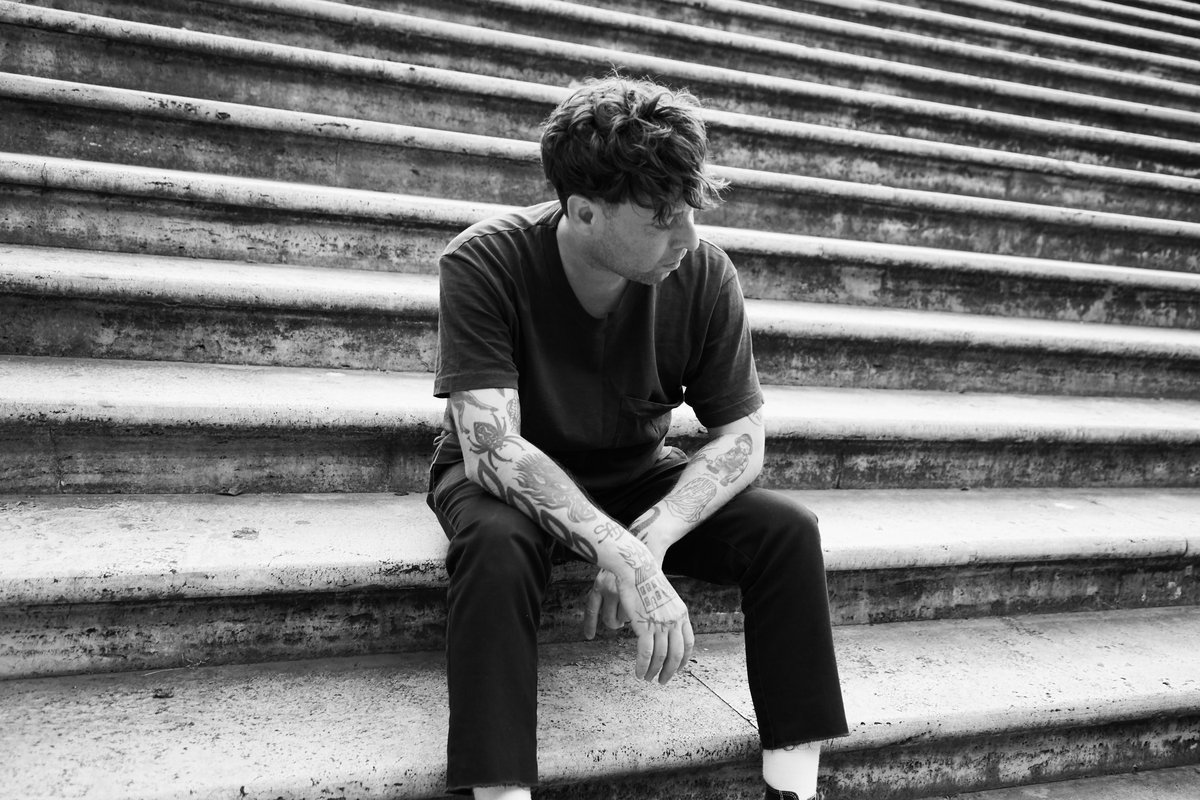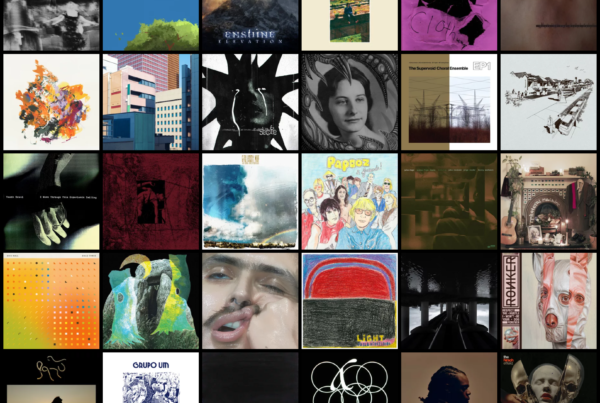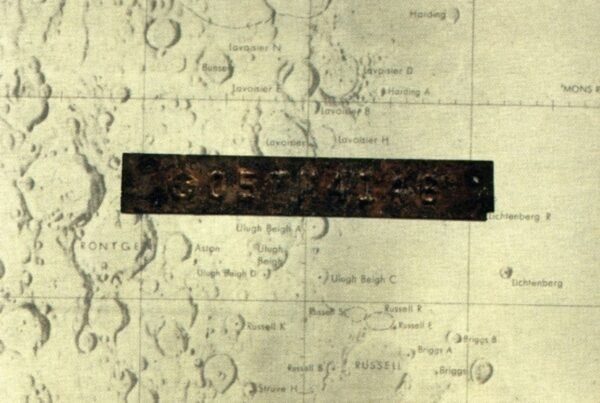The passing of Luis Vasquez last year left a large void in the post-punk world. Through his art, Vasquez pushed what post-punk is, can do, and cultivated a universal sense of authenticity not many artists achieve. One year later, Broc and I reflect on his passing and impact.
Broc Nelson
It has been about a year since the untimely passing of Luis Vasquez, known for his music project, The Soft Moon. In the year since his passing, I have been reflecting on his impact as an artist. The Soft Moon’s music is probably best known amongst goths, danceable but dark, introspective lyrically but brash musically, but the resounding cries of lament when Vasquez left this mortal coil was overwhelmingly about how his music made a deep, personal impact on fans. The Soft Moon’s lyrics were often personal, dealing with depression, family, relationships, etc., but for me, his passing lead to sort of a cultural revelation. In my review for Molchat Doma’s Belaya Polosa, I said that ‘Goth is a spirit.’ It was The Soft Moon that brought me to that conclusion, and I will, at least try to unpack what that means.
Every sub-culture creates an in-group, those who are so deeply committed to their subculture that it becomes a part of who they are, how they dress, speak, and relate to others in and outside of the group, and a significant part of the media and information they consume. Outsiders may think that the groups is weird or admirable, but for better or worse there is often an illusory barrier between the ins and the outs.
I have rarely been a part of cultural in-groups. I did some time with punk and metal scenes, but never felt like I was as immersed as others. Goth, however, always seemed to have this romance and mystique that I could never quite grasp. Joy Division, New Order, The Cure, Siouxsie And The Banshees, Bauhaus, and other classics of the genre have been in my listening rotation for over 20 years, but I wore too many earth tones, liked hip-hop and indie rock, and am a beer-gutted, bearded, bald guy who performs improv comedy and knows more about The Muppets and Jane Austen than most cis-straight guys my age. For every goth aesthetic that I adored, I had another, distinctly non-goth joy that seemed an insurmountable barrier for entry to that batty world.
Over the years, however, I found myself closer and closer to goth-ish things. First, I became interested in The Satanic Temple. That was about seven years ago, or so. Regardless of your own perception and thoughts about the religion (you can look up their beliefs on your own), I still think the tenets are one of the best guideposts for a well-lived and moral life, and that TST provides a much needed counterpoint to religious privilege and (in the US) a challenge to rising theocrats. I became an organizer for our local group and helped build a community of spooky looking humanists, met some great people, and had some sinful parties along the way. I no longer organize for them for a plethora of reasons, but I do hold that community in dear regard.
The second goth-y thing that happened was falling in with a local event organization group known as Void Church. I bartended and crafted a cocktail for their inaugural Goth Night and have been helping them in small ways for the last two years. DJs, dance parties, live bands, fog machines, and neon lights have a wide appeal, as it turns out, and it has been exciting to watch another goth community grow, with some crossover with TST, of course.
My love for all things goth never faltered, and surely, now that I was immersed in two black-clad, bat-loving, horror-movie watching, children of the night groups, I would feel goth, right? Yet, I still didn’t. I can’t get the look down. I still love other genres as much as I love music that could be considered goth. Maybe, the silliness of identifying with a single subculture was becoming more apparent, or maybe goth by association doesn’t work.
Then, I received a package from Sacred Bones Records that started to change my mind. I had purchased one of their Record Society packages which included like 5 or 6 special edition albums plus some other swag. One thing that was included was a cassette mixtape curated by Luis Vasquez (The Soft Moon’s Exister was part of the record bundle). Since The Soft Moon was my favorite artist from that package, I was stoked to see what goth, techno, industrial, post-punk, etc. would be on that tape. I popped it in without looking at the track listing and was pleasantly surprised to hear something totally unexpected coming from my speakers: hardcore punk.
It wasn’t just the first track, either, the whole thing was punk, specifically New York hardcore punk. Even The Beastie Boys tracks were from their early hardcore days. Of course, for a free mixtape, an artist could choose whatever they want, but I would think that offering a rare insight into one’s influences would generally be more aligned with the sounds that they make. So, it struck me as remarkable that Vasquez chose NYC hardcore to represent himself. Then the synthesis of all of this started to come together.
In Anatole France’s novel Revolt Of The Angels, a primary text for modern Satanism, Satan, confronted with the reality of dethroning God, refuses the war the titular revolting angels wanted, saying ‘Victory is a spirit.‘ Satan knew that if he were to ascend to a position of supreme power, he would be just as tyrannical as the god they were trying to depose, rendering the ultimate act of liberation a contradiction. Victory, in this case, comes from knowing that your actions and thoughts will never align with tyrants, the very essence of punk. After all, isn’t goth an offshoot of punk?
All of this time I had spent claiming to be a closet goth or feeling like I couldn’t present myself as goth as I would like didn’t matter anymore. I had been doing goth shit. I know a lot of the music, the films and literature that serve as cultural touchstones. Even if I am wearing an OutKast t-shirt, the goths in my life accept me, and that is punk as fuck.
I’m not sure if finding a sub-cultural identity is as important for younger folks these days. The instant accessibility of any subculture turns each subculture into a marketing tool, a costume of itself that anyone can put on. Going from Swiftie to Emo Night to Goth Night all in the course of a few weeks. The old New York hardcore dudes would never have it. It once was, that to be truly a part of a subculture, you had to let it consume you. ‘Find what you love and let it kill you,’ Bukowski said.
So, I leaned that I don’t need to be consumed by a subculture to be included in it, that most of the aesthetics are just window dressing to what lies beneath the people involved. As long as they are decent people, punks, goths, metalheads, hardcore kids, et al. will accept you. Dinosaurs will die, and the mark you leave on the world shouldn’t be merely window-dressing. Kindness, compassion, empathy, and justice should be essential to any countercultural movement or group.
For me, that is The Soft Moon’s legacy. Vasquez was a punk who found comfort and joy in the goth world. He didn’t dress like a vampire, but he did recognize that we all share suffering, that as much as his creative works were healing to him, they healed others as well. Even if you don’t feel at ease with the average public, there are others out there who understand, creative communities who thrive in the face of normalcy that will welcome you, no matter your appearance or interests outside of that community. We are multi-faceted, and all of those facets deserve compassion. So, rest in power Luis, thank you for the lessons, the empathy, and the incredible music. You are missed and loved by many.
Daniel Reiser
January 18th, 2024 was dark. The day crept in slowly with no sunlight, and was filled with cold rain showers, as is usually the case in Austin, but this time everything felt heavier. News broke early regarding the loss that left not one, but two music undergrounds shattered with the deaths of Silent Servant AKA John Juan Mendez, film producer Simone Ling, and Jose Luis Vasquez AKA The Soft Moon.
Vasquez was a visionary. His approach to the sound he developed was nothing unfamiliar to post punk, but carried its own auteur qualities. When a Soft Moon track was playing, you knew who it was, and it couldn’t be anyone else. Very few artists can pull that off. What’s even more, the lyrical content always drew from Vasquez’s trauma. Soft Moon was developed as a tool for Luis Vasquez to explore Luis Vasquez with authenticity always at the center. In an interview, when Tyler King at SFSonic asked Vasquez about the authenticity of his previous albums, Vasquez exclaimed:
‘Every fucking one of them was authentic. I don’t hold back on any of them. The only thing that I would say is that I was probably confused about who I am on all of them. Now with this record, I know who I am.’
That testament to authenticity is something that Vasquez constantly wore on his sleeve while balancing the nature of the subject material with the brevity of dark yet danceable soundscapes.
Every album shares a glimpse into his inner workings and psyche. Revealing an inner world full of introspection, desire, temptation, worry, elation, and pain, but also always brimming with optimism in the same measure. It’s what catapulted The Soft Moon from a roster of my casual post-punk listening into one of the most cherished artists I’ve heard across any genre.
For the past five years, The Soft Moon’s slow draw pulled me in after a chance listen to “Wasting” that burrowed its way into my psyche and continued to thrive through introspection. The dark and harsh soundscape against Vasquez’s whispery but sharp vocal delivery resonated loudly, while the contrast between the dreary instrumentals and delivery of the chorus:
‘Don’t stop the world you know you can’t / You have to live with what’s only real / Can’t stop the world and start again / you have to feel what’s only real.‘
The chorus bleeds with an enigmatic blend of optimism, desperate desire, and fear. It was a showing of pure genius that spoke more to the human condition than I ever knew was possible. I wasn’t aware of the large catalog that Vasquez built over the years that was full of this, and nothing else.
Being human carries a lot of weight. Our perspective curse gives way to complexities no other species has to deal with, but the cost is tenfold in the development of worldview. It can burden the best of us and humble the strongest of us, and we’re solely indebted to it all.
The Soft Moon thrived on this notion. Lyrically, Vasquez kept things simple, yet emotionally visceral. This project, the one he dedicated his entire life to, was a vehicle for him to explore his held trauma. Through the sonic exploration of that trauma Vasquez stood out amongst his peers, essentially molding post punk into a new form; familiar yet novel, and conceptually unique. The raw emotionality shines so bright, and in so many creative ways, and with a certain brilliance that can only be remembered through the loss of one of the greatest artists in this space.
The pairing of “When it’s over” and “Dead Love” on The Soft Moon exhibit Vasquez’s technical ability to extract sound that strives towards authentically expression of emotional process. The tragic loss of love song “When it’s over” waltzes in somber whispering while Vasquez develops a downward spiral mantra, simply repeating ‘I’ll say that I’m alright when it’s all over.‘ It’s a lament full of fear, sadness, and presented in such a way that just fucking feels really fucking heavy. The synth meanders and wanders around against a minimalist bassline that feels like intrusive thoughts before you can hear what could be considered the chorus, which just equates to Vasquez literally wailing. I had never heard such a deep display of emotionality presented with such clarity before; it was as breathtaking as it was heartbreaking.
As a companion track, “Dead Love” delivers the flipside of that wishful thinking of wanting (and hoping) to be ok, but not ever really getting there with the panic and mania that follows losing one you love, as Vasquez pleads ‘don’t leave me all alone / I want to breathe you / inhale your soul / touch your body / feel your bones.‘ It’s the realest and most raw display of unfulfillable desire one could hear recorded.
Although post punk, dark wave, or goth music thrive with the romanticism of heavy and dark feelings, Vasquez kept a steady balance of optimism that always cut through to deliver a sense of the human condition not many can manage.
“Become the lies” carries the similar heavy tonality that’s at the soul of The Soft Moon’s work on Exister, but comes coupled with an unbridled dancing in the video that equates only to freedom. Freedom from heavy feelings, freedom from the bullshit voices in your head, freedom from all of it as he sings: ‘Won’t be long, you know, son / Once I’m gone, you’ll know.‘ I’ll never know, because I never knew Vasquez, nor got to see him live, as my own mental health struggles got in the way of my last opportunity a year earlier.
On Deeper, Vasquez played with territories that rivaled Trent Reznor’s Downward Spiral era. The dark electronic driven heaviness weighs down any standard ‘feel good’ vibes, instead offering a feverish nihilistic dance tempo fury in a drugged-out haze. Zeros carries a similar vibe that feels akin to being flooded with thoughts alone, late at night, with no one to share them with. The isolation that every track carries is weighted in the very real isolation Vasquez was going through at the time, having moved to Venice alone.
Whenever we lose a human to the void it always prompts an abrupt shift of shock for the ones that were connected to them. It doesn’t seem to matter however that connection took place, whether its was a seldom acquaintance or a deep, multilayered, years-long relationship. We all feel something when someone we’ve engaged with decides to leave the table.
For artists, there’s a sense of shifting the rules a little bit. Art is, in essence, immortal, and serves as a living legacy for whomever created it. Much like we debate some faceless creator developing the beauty we experience in everyday life, the artist provides this world creation in real-time. With that duty locked in and acted upon, what we get are a massive collection of engagements that can result in connections to thousands of people, and those connections are merely one-sided, as the artist produces and shares, and the audience experiences it subjectively. That dynamic, by modern terms in the digital age is considered a parasocial relationship.
Luis Vasquez’s brilliance was always identifying the connective tissue of frantic emotional self awareness. It was a passive capability that was a driving factor for The Soft Moon, in its presentation of enigmatic anxiety that drives one from one thing to the next. All over his discography you can find detailed examples of deep layered and roughly textured audio that feels like it means one specific thing, but actually could mean almost absolutely anything. It’s a fine walk down the line of reflecting introspections on a universal psyche, but not particularly saying what that feeling represents for every single other person.
Although I never met the artist, nor was I ever able to see his live show, I felt connected to him, and his passing was felt. Parasocial relationships in the twenty-first century are just an odd existence; however, as humans we thrive on social connection, as it’s part of our nature. If it’s any consolation after the fact, Vasquez was incredibly integral and key into developing something through his records that I could feel, and in turn heal. I suspect I’m not the only one, and as we continue to go on in this plane of existence, it’s imperative to be grateful to the ones who teach, and help you. Indirectly, or maybe even directly, he did. He showed me authenticity is never to be compromised, and to live life through all the bullshit. That perseverance Vasquez exuded is demonstrated on five flawless albums that are not only simply post punk albums, but a testament of release.
Vasquez left us entirely too early. It’s a somber tone to a legacy that is beholden to not shying away from emotional turmoil and mental pain, but accepting it, as heavy as it is, and thriving with it to achieve a higher sense of consciousness that not many can provide. While we reflect back on his art a year after his passing, we can all reflect inwards on what makes us tick, and try to understand ourselves to the best that we can much like he did. I never met the person, nor was I able to witness the live showing of the art that I cherish, but that inextricable link of similar worldview will forever be there , and while I’ll miss him as an artist, his art will live on, and I hope it helps people in darker times, as it did for me. Rest easy, Luis.







Thank you for this. I identify with every word.